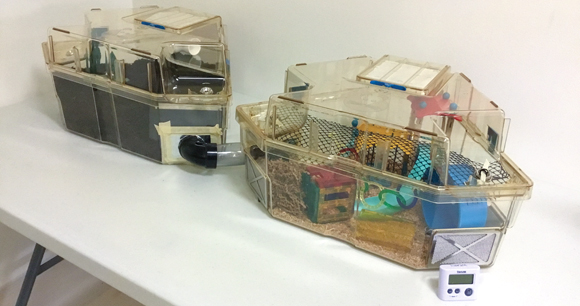Playpen Time Beneficial to Mice in Laboratories
Mounting scientific evidence indicates that environmental enrichment improves the welfare of laboratory mice, but most facilities worldwide still use standard housing (i.e., mostly barren “shoebox” cages). The provision of regular access to enriched environments such as playpens, even when mice are otherwise housed in standard cages, could provide an immediate method to improve welfare. Studies have shown that mice reared in enriched environments show lower anxiety. The first aim of this study—which was funded by an AWI Refinement Grant—was to determine if early-life provision of regular playpen access would decrease anxiety. It is also important to allow mice to experience positive emotional states, so the second study aim was to assess if mice perceived access to the playpen as rewarding.

Forty-two female mice of three strains (C57BL/6J, DBA/2J, and BALB/cJ) were housed in trios in 14 cages; each trio was randomly assigned to one of two treatments: playpen access (3 days/week for 30 minutes) or control (no playpen). After three months, emotional reactivity was assessed in all mice using two common tests of anxiety: an elevated plus maze (EPM), in which mice can explore a raised pathway with two open and two enclosed arms arranged in a plus (+) shape, and an open field (OF) test, where mice can explore a large, entirely open area. In such tests, bolder individuals produce fewer fecal boli (individual droppings) and venture more freely into the open arms of the EPM and the center of the OF. Following this, the playpen group was assessed in a choice test: From a starting position, mice could make their way directly to the playpen (treatment condition) or their home-cage (control condition), or stop along the way to eat food rewards, which would reduce their time in the playpen or home cage.
We found evidence that mice from the playpen treatment had lower anxiety compared to mice from the control treatment: Playpen mice produced fewer fecal boli (49 percent and 40 percent fewer in the EPM and OF test, respectively) and tended to spend about twice as much time in the center of the OF. We also noted differences in anxiety responses between strains: In both tests, C57BL/6J mice produced the fewest and BALB/cJ produced the most fecal boli; C57BL/6J mice also spent three and four times more time in the open arms of the EPM and in the center of the OF, respectively, compared to BALB/cJ and DBA/2J mice. Overall, in the choice test, mice spent 58 percent less time eating rewards when on their way to the playpen than when headed to their home cage.
Enriched housing is known to decrease anxiety responses in most of the variables measured in this study. Our results indicate that regular playpen access also decreased some measures of anxiety in mice. Additionally, we found that mice were more likely to forgo food rewards when this meant spending less time in the playpen—thus, mice find access to playpens rewarding. Consistent with previous research, we found that the beneficial effects of environmental interventions on anxiety may be greatest in C57BL/6J mice. Providing mice with regular access to a playpen can improve their welfare, and future research should focus on the way different strains uniquely benefit from playpen access.
Dr. Améndola Saavedra is a postdoctoral research fellow in the University of British Columbia’s Animal Welfare Program.
This study was funded by the Refinement Research Award program program. Learn more about this program or to view additional studies.
Program Terms: Animals in Laboratories
AWI Quarterly Terms: Feature Article
Related News
New Analysis: Animal Welfare Act Enforcement Deteriorates Following SCOTUS Ruling
In Program: Animals in LaboratoriesThe US Department of Agriculture, long known for its lackluster enforcement of the Animal Welfare Act (AWA), appears in recent years to have drifted even...
AWI Statement on Trump Administration’s Plan to Reduce Animal Experimentation Amid Attack on Science
In Program: Animals in LaboratoriesThe Animal Welfare Institute (AWI) applauds recent announcements by the National Institutes of Health and the US Food and Drug Administration about their plans to reduce the use of...
AWI Scholarship Winners Campaign for a Better World for Animals
In Program: Animals in Laboratories, Farmed AnimalsThe Animal Welfare Institute (AWI) announced today the 12 winners of a scholarship designed to invest in future leaders who seek to improve the lives...
AWI Supports Phasing Out Animal Use in Research and Testing, but Proper Planning is Essential to Protect Animals and Science
In Program: Animals in LaboratoriesLast month, both the National Institutes of Health and the US Food and Drug Administration announced plans to phase out the use of animals in...